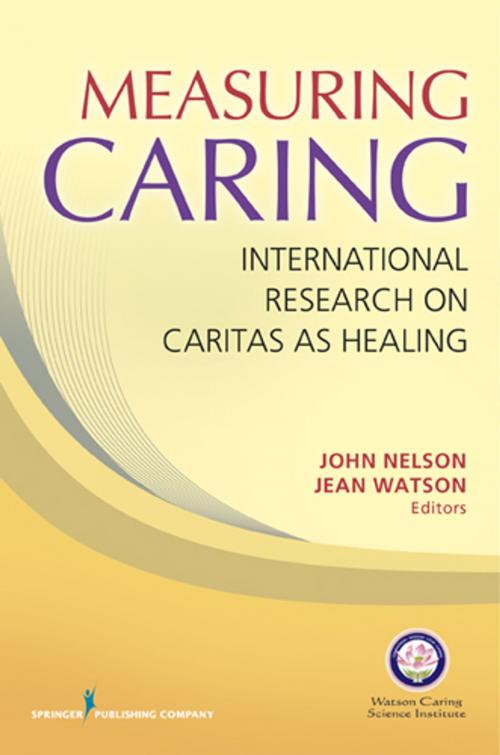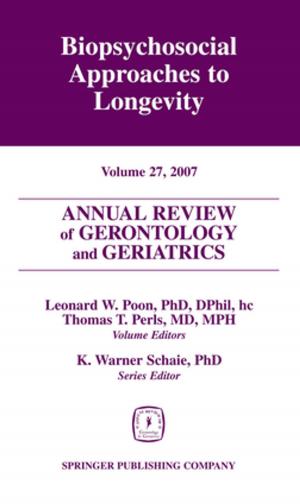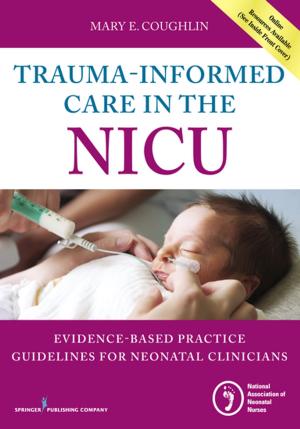Measuring Caring
International Research on Caritas as Healing
Nonfiction, Health & Well Being, Medical, Nursing, Research & Theory| Author: | ISBN: | 9780826163523 | |
| Publisher: | Springer Publishing Company | Publication: | August 24, 2011 |
| Imprint: | Springer Publishing Company | Language: | English |
| Author: | |
| ISBN: | 9780826163523 |
| Publisher: | Springer Publishing Company |
| Publication: | August 24, 2011 |
| Imprint: | Springer Publishing Company |
| Language: | English |
Jean Watson's Theory of Human Caring (Caritas) is now used in approximately 300 health care institutions in the United States and other institutions worldwide. This is the first international compendium of Caritas research, presenting the findings of 41 studies from 7 countries. The book examines similarities and differences in the ways in which each country applies Watson's Theory and documents the outcomes of these interventions. It addresses relationships between nurses and patients, nurses and their colleagues, self-care, and how Caritas is used to resolve outcome issues system-wide.
The book discusses at length eight different Caring Factor surveys, primary research tools for those using the Caritas process, which identify constructs that either support or impede caring in multiple settings. The first section focuses on the theoretical underpinnings of Caritas and presents seven adaptations of the Caring Factor Survey. Section II addresses measurements and methods for facilitating a caring relationship between nurse and patient. Measurements and interventions to facilitate Caritas in a variety of settings is the focus of Section III, and the final sections address the international measurement and international comparisons of Caritas. The volume will be an important resource for nurse leaders, educators, administrators in academia including unit managers, and for hospitals with or seeking Magnet status. The book serves as a complement to Watson's Assessing and Measuring Caring in Nursing and Health Care and Creating a Caring Science Curriculum: An Emancipatory Pedagogy for Nursing.
A co-publication with the Watson Caring Institute, this volume:
- Presents cutting-edge tools derived from the Caring Factor Survey for measuring caring in multiple contexts
- Discusses similarities and differences in caring contexts across nations
- Documents outcomes of Caritas in varied settings in the United States and internationally
- Addresses nurse-patient and nurse-colleague relationships, self-care, and resolution of system-wide outcome issues
Jean Watson's Theory of Human Caring (Caritas) is now used in approximately 300 health care institutions in the United States and other institutions worldwide. This is the first international compendium of Caritas research, presenting the findings of 41 studies from 7 countries. The book examines similarities and differences in the ways in which each country applies Watson's Theory and documents the outcomes of these interventions. It addresses relationships between nurses and patients, nurses and their colleagues, self-care, and how Caritas is used to resolve outcome issues system-wide.
The book discusses at length eight different Caring Factor surveys, primary research tools for those using the Caritas process, which identify constructs that either support or impede caring in multiple settings. The first section focuses on the theoretical underpinnings of Caritas and presents seven adaptations of the Caring Factor Survey. Section II addresses measurements and methods for facilitating a caring relationship between nurse and patient. Measurements and interventions to facilitate Caritas in a variety of settings is the focus of Section III, and the final sections address the international measurement and international comparisons of Caritas. The volume will be an important resource for nurse leaders, educators, administrators in academia including unit managers, and for hospitals with or seeking Magnet status. The book serves as a complement to Watson's Assessing and Measuring Caring in Nursing and Health Care and Creating a Caring Science Curriculum: An Emancipatory Pedagogy for Nursing.
A co-publication with the Watson Caring Institute, this volume:
- Presents cutting-edge tools derived from the Caring Factor Survey for measuring caring in multiple contexts
- Discusses similarities and differences in caring contexts across nations
- Documents outcomes of Caritas in varied settings in the United States and internationally
- Addresses nurse-patient and nurse-colleague relationships, self-care, and resolution of system-wide outcome issues















